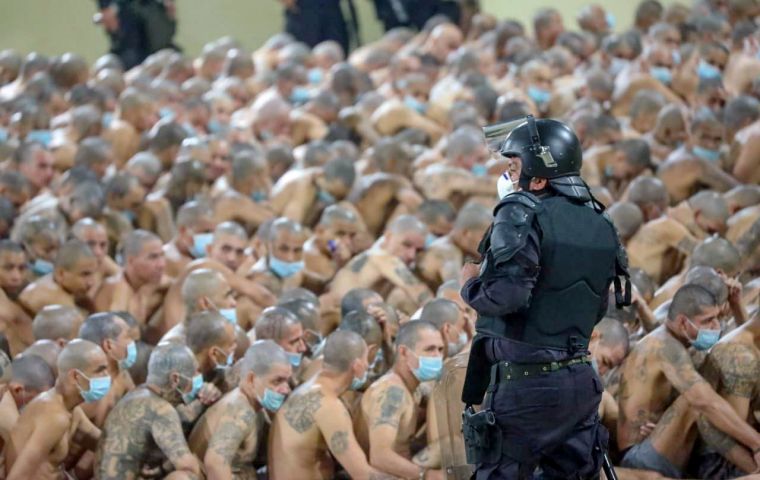MercoPress. South Atlantic News Agency
Nearly 34,000 arrested under El Salvador's state of emergency
 Murders had been deescalating since 2016 until an alleged breach of an agreement between a leading gang and Bukele's administration
Murders had been deescalating since 2016 until an alleged breach of an agreement between a leading gang and Bukele's administration Around 34,000 people have been placed under arrest thanks to the state of emergency in force in El Salvador since March 27, it was reported Monday as Congress is set to agree on yet another extension of the measure. Human rights organizations have warned of arbitrary arrests.
According to the National Civil Police (PNC), from March 27 to May 22, 33,812 people have been seized on charges that they belonged to terrorist organizations and violent gangs, although no further details have been released as to the degree of each individual's involvement in said groups.
The exception regime, enacted to curb gang violence after an escalation of murders at the end of March, suspends the right to defense while administrative detention is increased from a maximum of 3 days to 15 days. Detainees under this regime are held for up to 15 days, after which they face an initial hearing at which, in most cases, they are assisted by a public attorney appointed to them by the Attorney General's Office. In the meantime, those arrested are sent to different prisons nationwide.
Under the state of emergency, citizens have also been deprived of other constitutional rights, such as freedom of association and assembly.
President Nayib Bukele asked Congress in March to approve an exception regime for 30 days after a wave of murders between March 25 and 27. The measure was extended April 25 and the regime is expected to span for 30 more days at the request of the Salvadoran head of state.
According to a press report, an alleged breach of a pact between the government and the Mara Salvatrucha (MS13) gang had triggered the wave of murders.
Before March, the Bukele administration claimed to have control over the country and had a drop in murders to show for it, which it claimed was due to the government's Territorial Control plan.
Gangs are a legacy of the country's civil war (1980-1992) which has worsened since the deportation of many of their members from the United States. More than 70,000 reportedly belong to these organizations.




Top Comments
Disclaimer & comment rulesCommenting for this story is now closed.
If you have a Facebook account, become a fan and comment on our Facebook Page!